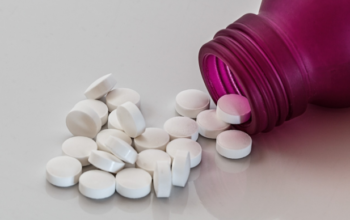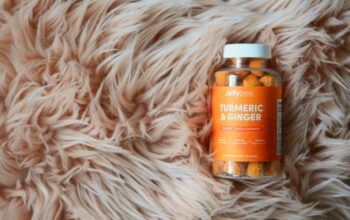We only include products that we believe are of value to our readers. We may be compensated if you make a purchase through the links on this page.
If you exercise regularly you will want to make sure you are getting the best out of it.
Gaining muscle and strength is an important benefit of exercising. A healthy amount of muscle will allow you to do your best in exercise and everyday life.
Maximal muscle growth requires three main factors: more calories than you consume, more protein than your body breaks down, and a challenging exercise program.
Although it is possible to meet all of these criteria without using dietary supplements, some supplements can help you reach your goals.
These 6 supplements may help you build more muscle through your exercise program.
 Creatine is a natural molecule found in your body. It is essential for energy production in your muscles and other tissues.
Creatine is a natural molecule found in your body. It is essential for energy production in your muscles and other tissues.
It can be used as a dietary supplement to increase muscle creatine levels by up to 40%.
Creatine can affect your muscles cells and exercise performance, which promotes muscle growth. Creatine improves muscle strength according to a lot of research.
This is great news for anyone trying to build muscle. These best supplements for muscle gain will allow you to exercise more effectively and lead to greater muscle mass growth.
Creatine can also raise water content in muscle cells. Creatine can cause muscle cells to swell and signal for growth.
This supplement can also increase the levels of hormones that are involved in muscle growth such as IGF-1.
Research has shown that creatine may decrease protein breakdown in muscles.
Many researchers have looked at creatine supplements and exercise and found that creatine can increase muscle mass.
Creatine, which has been extensively studied, has a remarkable safety profile.
Consider creatine first if you’re looking for a supplement that will help you build muscle.
For muscle gain, it is important to get enough protein.
To gain muscle, you must consume more protein than your body can use through natural processes.
It is possible to get all of the protein you need from protein-rich foods. However, not everyone can do it.
This may be you. You might want to take a protein supplement.
There are many protein supplements on the market, but the most well-known are whey protein, casein, and soy protein. Protein supplements can also be made from protein taken from beef, chicken, eggs, or other sources.
Research has shown that supplementing with protein can increase muscle mass in those who exercise more than adding carbs.
The effects of low protein intake are likely to be the greatest.
Research shows that high levels of protein supplements don’t increase muscle mass if you already eat a high-protein diet.
Many people are curious about what amount of protein they should eat each day. For active people looking to build muscle, it is recommended that you consume 0.5-0.9 grams (1.2-2.0g per kilogram) of protein.
Weight gainers are nutritional supplements that can be used to help you eat more calories and get more protein. These are often used by people who want to build muscle.
People find it difficult to gain muscle, even if they eat a lot and lift weights.
While the calorie content of weight gainer pills can vary, it is not unusual for them to have over 1,000 calories per serving.
People mistakenly believe that these calories are made up of protein, as it is so vital for muscle building. But, the majority of calories come from carbohydrates.
These high-calorie supplements often contain 75-300g of carbs and 20-60g of protein.
These products may help you eat more calories but it is important to remember that weight gainer supplements are not magic.
Research has shown that increasing your calories can dramatically increase muscle mass in physically inactive people, provided you consume enough protein.
Research in adult weight-trainers has shown that taking a weight-gainer supplement might not be an effective way to increase lean mass.
Weight gainers should not be used if you have difficulty eating enough real food or if it is easier to consume a weight-gainer shake than to eat more of the real thing.
Beta-alanine an amino acid that may reduce fatigue and increase exercise performance.
If you’re following an exercise program, beta-alanine could help you increase your muscle mass.
A study found that college wrestlers and footballers who took 4g of beta-alanine daily for 8 weeks had more lean body mass than those who took a placebo.
Another study found that adding a beta alanine supplement to a 6-week high-intensity interval training program increased lean body weight by approximately 1 pound (0.45kg) more than a placebo.
 Although more research is needed on beta-alanine’s effects on muscle gain, this supplement could help to support muscle growth when used in conjunction with an exercise program.
Although more research is needed on beta-alanine’s effects on muscle gain, this supplement could help to support muscle growth when used in conjunction with an exercise program.
The branched-chain amino acid (BCAAs), consists of three distinct amino acids: leucine. isoleucine. and valine.
They can be found in almost all protein sources, especially those of animal origins, such as meat, poultry, eggs, and dairy.
BCAAs are critical for muscle growth. They make up approximately 14% of all amino acids in your body.
BCAAs are a common food ingredient, but many people also consume them as a supplement.
Research has not shown that BCAAs can increase muscle gain or decrease muscle loss when compared to placebo.
Other research has shown that BCAAs do not increase muscle gains when used in conjunction with an exercise program.
If you don’t eat enough high-quality proteins, it is likely that BCAA supplements will not be of any benefit to you.
They may be helpful if you have a poor diet, but more information is required before BCAAs can be recommended as a supplement to muscle growth.
Beta-hydroxy betamethylbutyrate (HMB), is a molecule produced by your body’s amino acid leucine.
HMB is responsible in part for the positive effects of protein and leucine.
It could be particularly important in reducing the breakdown of muscle proteins.
Although HMB is naturally produced by the body, supplementation with it may increase its levels and benefit your muscles.
Numerous studies have shown that weight training can increase lean body mass by taking in 3-6 grams of HMB daily in untrained adults.
Other research has shown that HMB doses similar to those used in weight training are unlikely to increase muscle mass in adults who have had prior experience with it.
 HMB may be most beneficial for people who want to get started exercising or increase the intensity of their workouts.
HMB may be most beneficial for people who want to get started exercising or increase the intensity of their workouts.
Many other supplements also claim to increase muscle mass. Conjugated linoleic acids, testosterone boosters, and glutamine are just a few of the supplements that claim to increase muscle mass.
The evidence is not clear.
- Conjugated Linoleic Acid (CLA) CLARefers to a grouping of omega-6 fatty acids
- Acids that have multiple effects on the body. CLA is a compound that can increase muscle mass.
- Mixed results have been achieved, so it’s not clear if this is beneficial.
- Testosterone boosters Supplements that increase testosteroneInclude
- D-aspartic Acid, Tribute Terrestris, Fenugreek and DHEA. It is
- These compounds are likely to only be beneficial for those who have low testosterone.
- Glutamine, carnitineThese are most likely
- Not effective in increasing muscle mass for active people of middle-aged or young age
- Individuals. Studies have shown that carnitine has a positive effect on individuals.Some
- BenefitsFor muscle mass in the older.




